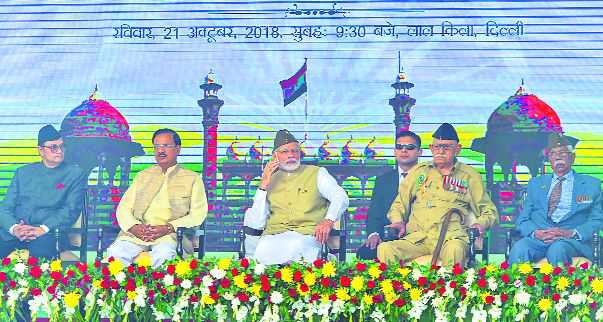
Netaji had envisioned the ideal Indian army on ideological considerations.
Vappala Balachandran
Ex-special secy, Cabinet secretariat, & Author of ACN Nambiar’s Biography
A LEADING daily quoted PM Modi announcing on October 21: ‘We are heading towards building an army that was envisioned by Netaji Bose’. He was speaking at the 75th anniversary of the formation of the ‘Azad Hind Government’ by Netaji Subhas Chandra Bose in Singapore. It is doubtful whether the PM had understood the import of his declaration.
Which army did he mean? Bose had led two armies, one he raised in Germany and another he inherited in Southeast Asia. The INA, his second army, was assembled originally by Giani Pritam Singh of Bangkok and Capt Mohan Singh of 1/14 Punjab Regiment after the British defeat in North Malaya on December 11, 1941. Leadership squabbles within the INA after the fall of Singapore in 1942 made the Japanese and local Indians request Netaji to take over the command of this army.
On April 29, 1941, Bose requested German foreign minister Ribbentrop for help in training an Indian army for independence. He said: ‘Freedom is not given but taken’. A company-strong ‘Indian Legion’ (IL) raised from volunteers of Indian POWs was ready by autumn with the help of Cavalry Captain Walter Harbich. By 1943, the strength had risen to 2,000-3000. German author Rudolf Hartog, who worked as interpreter in the legion, described it as the ‘forerunner of the Indian National Army’.
In many ways, the IL had heralded Indian quest for independence before the INA. The first meeting of the Azad Hind Office or Free India Centre in Berlin on November 2, 1941, decided that ‘Jai Hind’ would be the greeting among Indians, Jana Gana Mana would be the National Anthem, Hindustani would be the national language and ‘Netaji’ would be Bose’s title. Jana Gana Mana was first sung at Hamburg on September 11, 1942, at the founding of the Indo-German Society. The IL celebrated January 26, 1943, as Indian independence day.
In August 1941, Bose summoned his confidante ACN Nambiar to Paris to ask him to be his trusted deputy in the Azad Hind office in Berlin. Nambiar took over the European operations in February 1943 when Bose left for the Far East to assume INA leadership. Nambiar was designated as ‘minister without portfolio’ in Bose’s provisional government announced from Singapore.
Bose told Nambiar that only an attack from outside would ‘shake the lethargy’ of the Congress and force the British to leave India. A foreign attack would also unite Hindus and Muslims and defeat Jinnah’s Partition plans. Nambiar told me: ‘He expressed trust in the attack well conducted bringing the support of Muslims in India’.
Like Gandhi, the Hindu-Muslim unity was paramount for Bose, who did not enlist every POW. He insisted on several conditions. Nambiar said Bose wanted the IL to be taken to India. Hartog says: ‘By making specific conditions about the structure of the Indian Legion, Bose also gave a political message as the tangible expression of his vision of the future India’. Bose did not want to raise only ‘class companies’ or ‘martial races’ unlike the British Indian Army. He felt that this segregation was only serving to cement regional loyalties to the detriment of national interests. Thus his first condition was that his army should not be separated into different communities. No distinction of race, religion or caste was to be made. Ulrich von Kritter of the German army, who helped Bose raise the IL, had said they did not copy the British colonial army in segregating men according to their religion. ‘We have instead mixed Muslims (Pathans and Punjabi Muslims), Sikhs and Hindus (Dogras, Rajputs, Jats, Bengalis, Gharwalis, Marathas, Madrasis and Gurkhas) down to the sections’.
Secondly, Bose did not want to segregate military residences from the local population. The third condition was that all POWs should start as common soldiers in ranks, irrespective of the status they held in the British Indian Army. This created managerial problems as they would have liked Indian officers to command them instead of Germans.
The fourth condition was that there should be only one language, Hindustani in Roman script. This created a problem for those used to English words of command and to German instructors who had to learn a new language. It also created a problem of the choice of words in Hindustani as Hindus, Muslims or Sikhs preferred words equivalent to their own linguistic traditions.
These terms created serious problems for soldiers who wanted different diets and religious holidays and who were not easily converted to Bose’s ‘inter-communalism’. Hartog mentions the case of Ibrahim, a zealous ‘propagandist’ of the First Battalion who was killed by his comrades as his ‘inter-communalism’ was resented by orthodox Muslims. Indologist Prof Paul Thieme, chief Interpreter for the legion, quotes another case of a Sikh soldier who was sentenced to death for killing Muslim comrades for snatching off his turban during a fight. He was sentenced to death by a firing squad of two Hindus, two Muslims and two Sikhs. One of the Sikhs fired in the air since a Sikh must not kill another Sikh. ‘The other Sikh, who fired, was found stabbed to death in his bed the next day’.
Bose had conceived a higher template for an ideal Indian army on ideological considerations. Did the PM consult military leadership or his core support base before declaring that our 21st century army would be built on a model envisioned by Netaji in the 1940s?



























